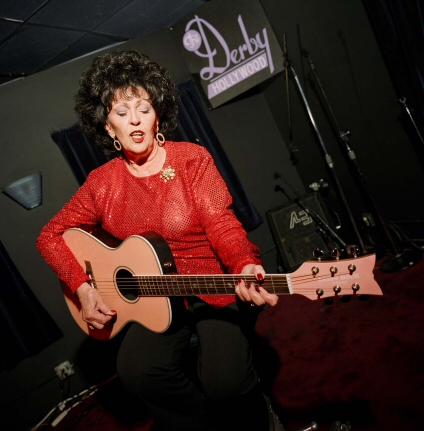QUEEN OF ROCKABILLY HAS RULED
OVER FIVE DECADES
By Barry Gilbert
Of the
Post-Dispatch
|
 |
June 24, 2004
Wanda Jackson was present at the creation of rock 'n' roll. For girls
with guitars, she was the creation of rock 'n' roll. She wore Elvis
Presley's ring around her neck, rebelled against wearing cowgirl outfits
and standing demurely in place onstage, and she told the Grand Ole Opry
where to get off.
Now, "Hurricane Wanda" is enjoying at least her third career rebirth
and, at age 66, is singing with her second Elvis.
Her trademark growl is intact on "Heart Trouble," her first new CD in
20 years. It is a strong collection of new songs, rerecorded hits, and
duets that cover rockabilly, country and gospel. She'll be at Off Broadway
tonight for a rare St. Louis appearance.
Forging a reputation in rock 'n' roll was not easy for the Oklahoma
girl who, with Hank Thompson's band, began singing country music while
still in high school in 1954. In fact, it wasn't her idea; it was
Presley's.
"You have to remember," Jackson says last week from her home in
Oklahoma City, "rock 'n' roll was a man's field (in the mid-'50s) with
Elvis, Jerry Lee (Lewis) and Carl (Perkins). I was the only girl out there
by myself." |
After Jackson graduated from high
school, and with a couple of country songs already on the charts, her
manager-father hooked her up with Bob Neal, Presley's first manager, in Memphis,
Tenn. Neal needed a "girl singer" for the package tours he built around
Elvis.
"Elvis was beginning to get hot in 1955-'56-'57, and everything was
happening," Jackson recalls. "And there weren't many artists who could work with
Elvis. The audience wanted to see him, and sometimes they were just very ugly to
opening acts, big names like Webb Pierce and Faron Young. But they accepted me,
and that's why I worked with Elvis as much as I did."
Presley and Jackson dated and hung out together, and the future King of Rock
'n' Roll played his favorite records for the future Queen of Rockabilly.
"He went out of his way to encourage me to try (rock 'n' roll)," Jackson
says. "And, after all, it was my generation's music. I loved it. I was a
teenager myself, and I was as big a fan as Elvis had anywhere."
But it took Jackson a couple of years before she was ready to try singing,
writing and recording rockabilly. "Fujiyama Mama" was a success in Japan in
1958, and two years later she hit the U.S. Top 40 with "Let's Have a Party," a
song Elvis had cut earlier for his movie "Loving You." Other hits followed,
including "Mean Mean Man" and "Funnel of Love," as well as "Santo Domingo," sung
in German for that market.
While Jackson never gave up country music - she had trouble getting airplay
so she paired her rockabilly songs with country B-sides - she did give up the
cowgirl look.
"I wanted to wear a tight skirt, and I wanted fringe that moved - (my mother
and I) came up with silk fringe and rhinestones - and I wanted it low cut," she
says. "Me and my daddy went round and round about that one."
In 1957, Jackson was invited to appear at the Grand Ole Opry, and she
designed a special dress, but Opry officials forced her to cover her
shoulders.
"It broke my heart," she says. "When I was done, I said to my father, 'Let's
get out of here. I'll never come back.' And I never did. They just weren't ready
for us."
In 1971, Jackson and her husband, Wendell Goodman, whom she married in 1961
and who quit his job with IBM to guide her career, "gave our hearts to Jesus
Christ," and Jackson spent the next decade-and-a-half recording only gospel
music.
"I didn't intend to divorce country and rockabilly," Jackson says.
"Country-music stations just felt, 'She's gone religious now, and we don't need
to play her records anymore.' And they didn't. So I had to depend on gospel
records. ... To this day, whenever I perform, I always give a brief testimony,
and I always do a gospel number."
In 1985, her secular career was reborn in Europe, and then in Japan. In 1997
alone, Jackson did five tours in Europe.
Jackson's secular rebirth spread to America in 1995 courtesy of
alt-country-rockabilly artist Rosie Flores, who called on Jackson and another
'50s pioneer, Janis Martin, to sing on her "Rockabilly Filly" CD.
"I give her (Flores) total credit for the revival here in America, bless her
heart," Jackson says. "She's been such an intricate part of all this. We're like
soul sisters."
Flores returns the favor on "Heart Trouble," and she's joined by other
admirers, many of whom heard Jackson was recording in Los Angeles and asked to
help out: psychobilly band the Cramps, ex-Stray Cat Lee Rocker, ex-Blaster Dave
Alvin and that other Elvis.
Elvis Costello and Jackson's duet on the Buck Owens standard "Crying Time" is
a gem and one of the few collaborations done face-to-face.
"He said he was a big fan of mine," Jackson says. "He said his payment would
be to sing with me live in the studio. He brought his band, and we had
microphones facing each other, and he was playing guitar and his band was
playing right along with us. It worked, and I was thrilled he would do that for
me."
BACK
TO MAIN PAGE
